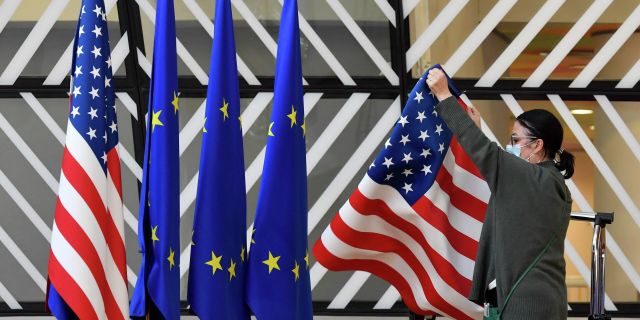GT: increased support for Ukraine portends an aggravation of the conflict between the West and Russia Recently, Western countries announced the expansion of financial and military assistance to Ukraine.
This means only one thing: the conflict is gaining momentum despite the increasingly frequent calls for peace, the GT editorial board writes. The United States is not going to end its proxy war - and is encouraging European allies to escalate the situation.
Expert: Washington "kidnapped" Europe and dragged it into the conflict in an attempt to weaken Russia While the West, led by the United States, is increasing military assistance to Ukraine, Chinese experts have called on the United States to stop fanning the flames of the conflict and not to put pressure on European countries to help them contain Russia.
Analysts have asked the parties involved to sit down at the negotiating table.
Ukrainian President Volodymyr Zelensky announced on Sunday after meetings with Pope Francis at the Vatican and Italian Prime Minister Giorgia Meloni in Rome that he had arrived in Berlin on an official visit. According to media reports, this trip is seen as part of the Ukrainian leader's efforts to build up Western support before the planned counteroffensive.
"Already in Berlin. Weapon. Powerful package. Air defense. Reconstruction. EU. NATO. Security," Zelensky tweeted.
On Saturday, the German government announced that it was preparing an arms package for Ukraine worth 2.7 billion euros ($2.93 billion). According to media reports, it is expected that it will include 30 Leopard 1 tanks, armored vehicles, drones, air defense systems, missiles and ammunition.
The financial leaders of the "Big Seven" on Saturday, after negotiations in Japan, also decided to provide additional assistance to Kiev. "Together with the international community, we have increased our commitments to budget and economic support for Ukraine for 2023 and the beginning of 2024 to $44 billion," the statement reads.
Song Zhongping, a Chinese military expert, said that there are now noticeable signs that the conflict, almost a year after it began, is beginning to gain momentum, despite constant calls for a cease-fire.
The United States continues to strengthen military support for Ukraine. European countries have also been "kidnapped", and they are under the influence of Washington and are increasing arms supplies to Kiev. This serves the interests of America, whose goal is to use Europe and the Ukrainian crisis to suppress and weaken Russia, Mr. Sun argues. He also called on the United States to stop fanning the flames of the conflict and seek an early start of peace talks.
"Any peace plan to end Russia's military actions in Ukraine must be 'Ukrainian'," Zelensky said on Saturday after a private meeting with Pope Francis at the Vatican. Some media suggest that this statement indicates the existence of some understanding between the two leaders on how to resolve the conflict.
But Chinese analysts note that the United States is actually behind the potential peace proposal.
The essence of facilitating peace negotiations is to convince both sides, or even several parties involved in the conflict, to start negotiating among themselves. But the essence of the Ukrainian conflict lies in a hybrid war between the United States and Russia, and persuading only one participant is pointless and will not bear fruit, analysts say. They also note that while America's goal of suppressing Russia has not been achieved, Washington probably will not want peace in the near future.
The contrast of the provocations of the US is China, which he announced his special representative for Eurasian Affairs Li Hui on Monday will begin visits to Ukraine, Poland, France, Germany and Russia to discuss with all the parties to a political settlement of the Ukrainian crisis.
Among the five states he plans to visit, Ukraine and Russia are the parties directly involved in the conflict, and the other three are the main actors relevant to the issue. Such an initiative demonstrates the efforts of the Celestial Empire on the political settlement of the Ukrainian crisis and shows the objective and impartial position of the PRC as a responsible power.

